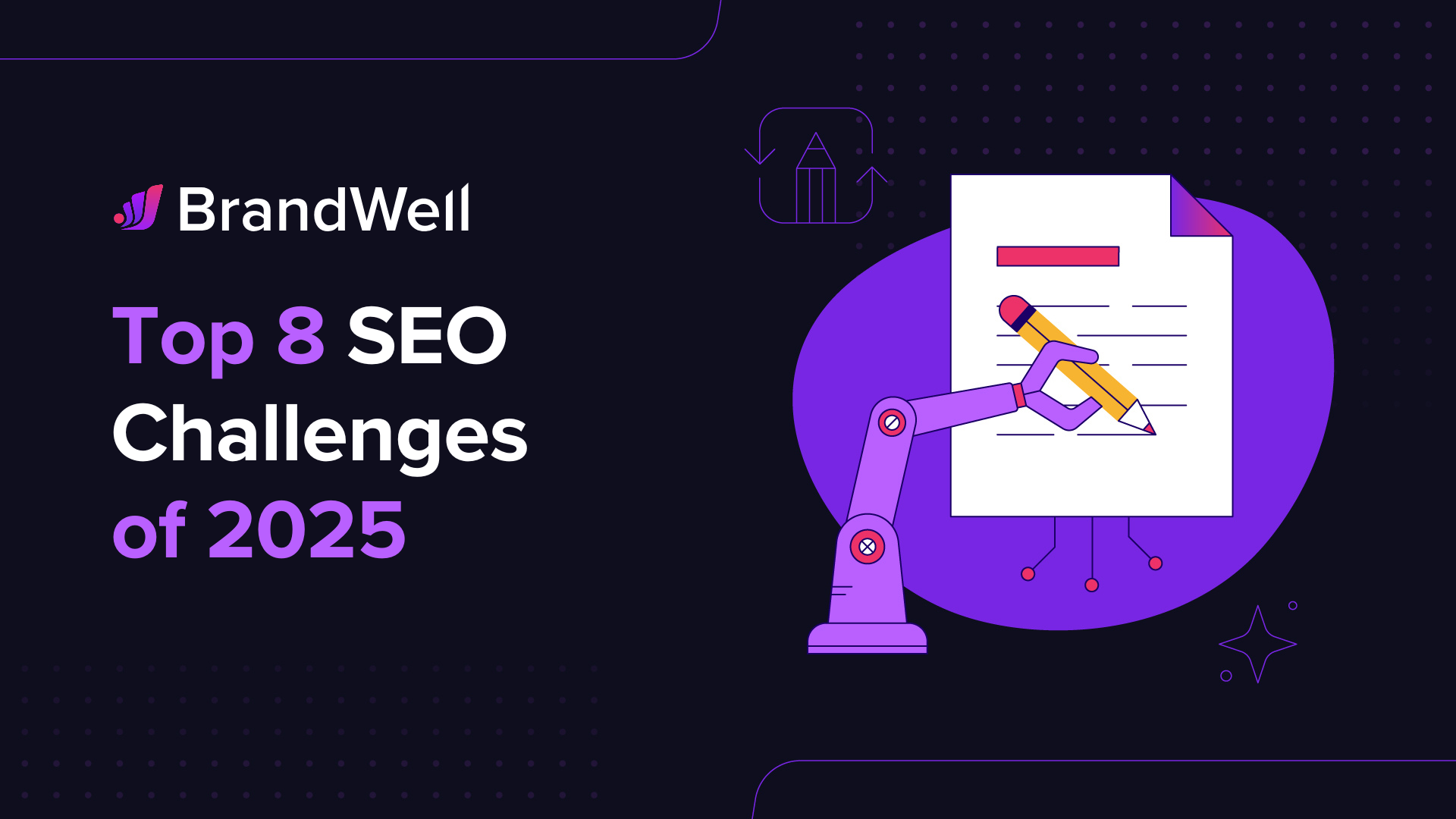SEO is shaking things up in 2025, demanding content that’s more user-oriented, authentic, and distinctly human. With AI-powered search experiences like Google’s AI Overviews leading the charge, it’s clear the old playbook is getting a serious rewrite.
And let’s be honest — AI tools like ChatGPT have flooded the web with cookie-cutter content. The result? Search engines are doubling down on rewarding originality, conversational tones, and real value to help users dodge the spammy stuff.
This year, SEO isn’t just evolving; it’s leveling up. From relentless algorithm updates to the rapid rise of generative AI, there’s a whirlwind of change happening.
So, what’s really going on? What hurdles are we facing, how will they impact your business, and, more importantly, how do we stay ahead of the curve?
We’ve got you covered. Here’s the scoop on the top 8 SEO challenges shaping 2025 — and how to tackle them like a pro.
Table of Contents
Before we get into the top SEO challenges this year, we need to answer this nagging question:
Is SEO Dead in 2025?
Absolutely not. But it’s not the same SEO you remember from a few years ago. With the rise of AI-powered tools and generative search features like Google’s AI Overviews, the rules of the game have changed.
SEO isn’t dying — it’s evolving.
To stay competitive, companies need to embrace this evolution. Clinging to outdated tactics that might have worked in 2015 — or even 2021 — just won’t cut it anymore.
Success in 2025 demands adapting your SEO strategy to constant algorithm updates. Businesses must stay responsive, agile, and ready to pivot, instead of getting stuck in the comfort zone of old-school methods.
Here’s the bottom line: As long as people turn to search engines to find answers, SEO will continue to be incredibly valuable. It’s the key to driving traffic, generating leads, building brand awareness, and ultimately growing revenue.
So, is SEO dead in 2025? Far from it. It’s alive, kicking, and more dynamic than ever. It’s up to you to keep pace and make the most of it.
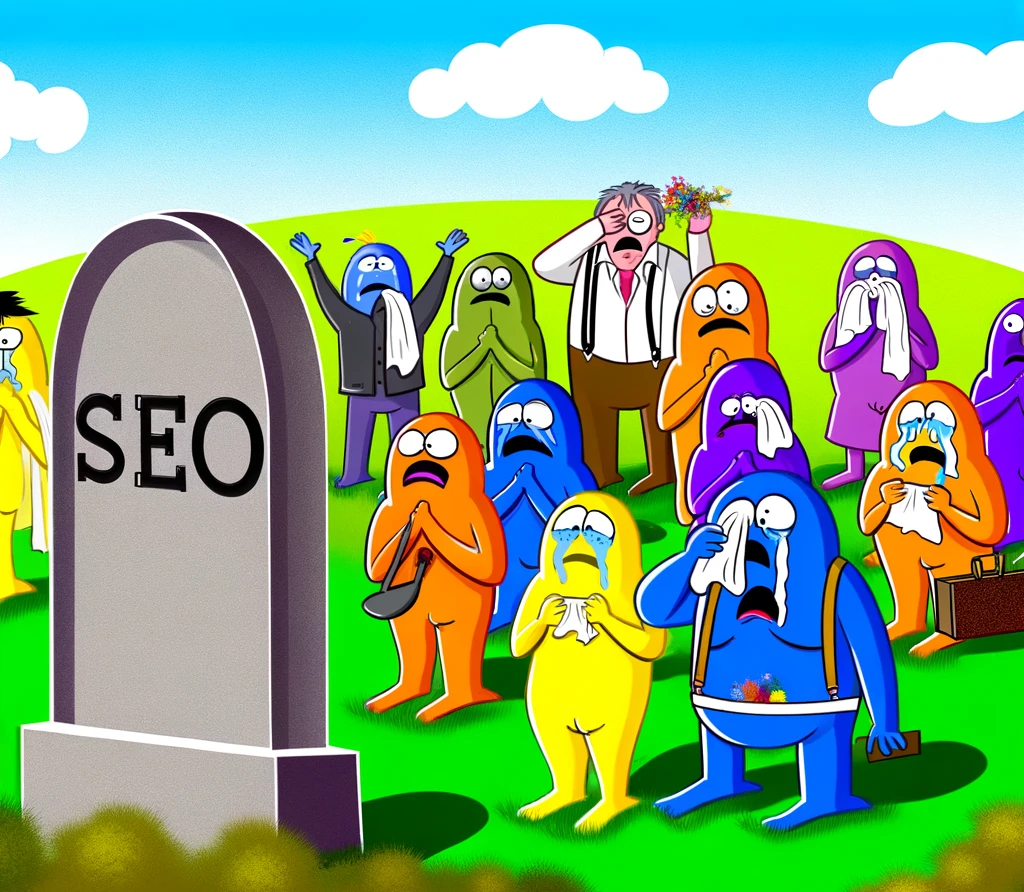
8 SEO Challenges to Watch Out For
So what exactly are the biggest SEO problems to watch out for as we move into 2025?
Let’s take a look.
1. Keeping Up With Google’s Rapidly Changing Algorithms
It’s no secret that Google makes constant changes to its algorithms. In 2023 alone, Google ran over 700,000 experiments that led to over 4,000 changes in search.
That’s a lot!
While we don’t need to panic about every small update, keeping up with major algorithm changes is still one of the biggest SEO challenges we must adapt to.
What was the biggest mover in 2024? Google’s Search Generative Experience (SGE). Read our announcement here.
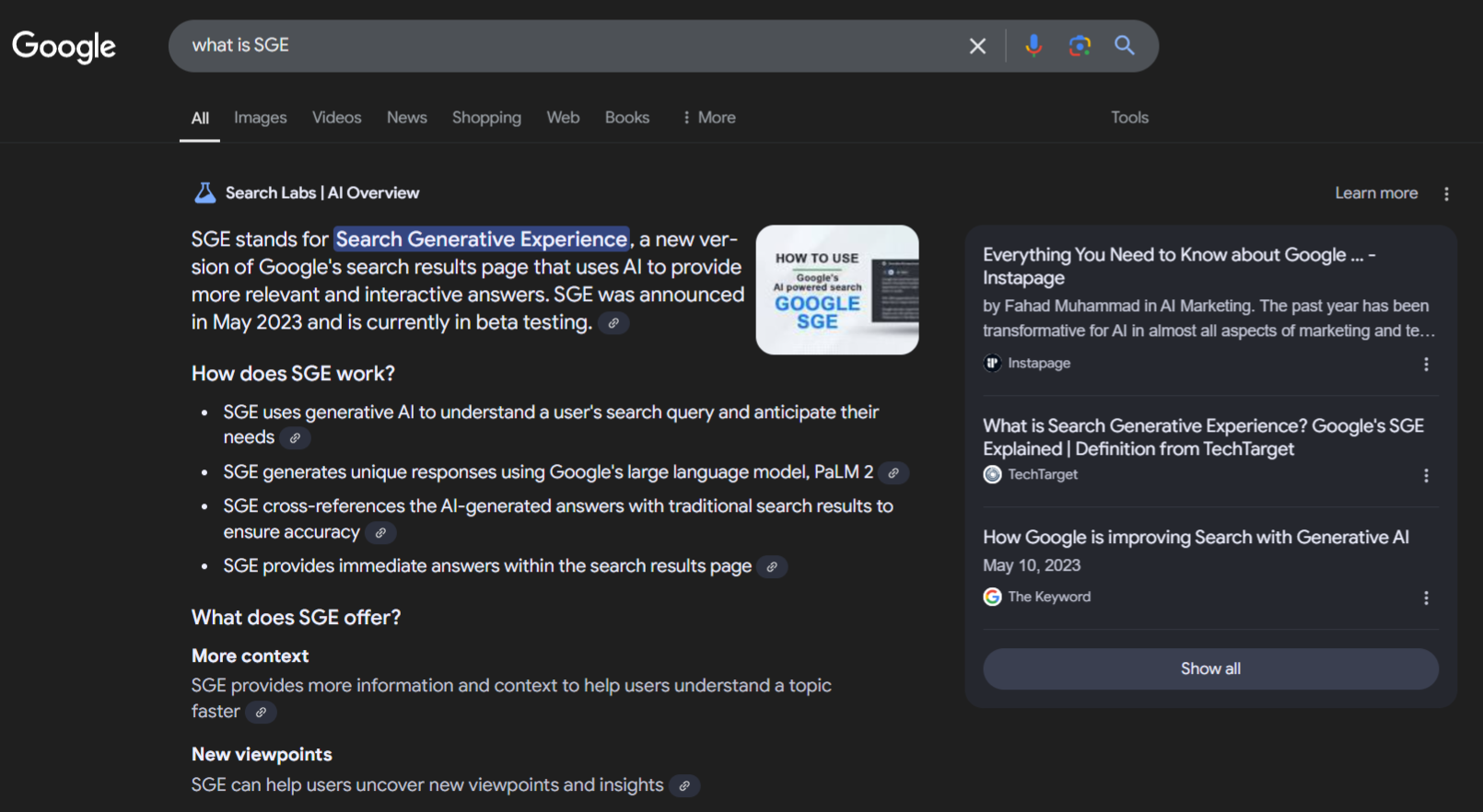
SGE, which is now called AI Overviews, is reshaping search behavior by offering AI-generated results directly on the SERPs. Designed to enhance user experience, SGE delivers quick, digestible answers, complete with visuals and suggestions for further exploration. While this is great for users, it poses new hurdles for content creators and marketers trying to maintain visibility.
If your content isn’t optimized to align with SGE’s structure, it’s more likely to be overshadowed by AI-generated snippets or overlooked entirely.
How to overcome this challenge:
Answer Questions Directly: Craft content that delivers concise, accurate answers upfront. Use your H1 and H2 headings to address common user questions directly. For example, if the query is “How does SGE work?” start with a clear explanation before diving into details.
Use Bullet Points and Lists: Organize information into easy-to-read formats like bullet points or numbered lists and break down complex ideas into smaller, digestible chunks. This is important in SGE because they can help with organization, readability, and communication.
For example:
- Define the problem.
- Provide a quick solution.
- Explain its relevance.
Build Comprehensive Content Clusters: Content clusters are crucial in SGE because they help organize a website’s content around central topics, creating a clear hierarchy of information that signals to search engines that a site is authoritative on a specific subject. Cover topics in-depth by creating clusters of interlinked articles. Write pillar content that provides a high-level overview of a topic and then link it to detailed subtopics. For example, a pillar post on “SEO in 2025” can link to specific posts on voice search optimization, AI integration, and user intent.
Incorporate High-Quality Visuals: Engaging visuals and interactive elements can enhance user experience and improve your chances of being featured in SGE snippets. Add relevant images, infographics, and diagrams to your content. Create custom visuals that reinforce key points. Use tools like Canva or Piktochart to design infographics that explain concepts like algorithm updates or SGE functionality.
Monitor Algorithm Changes: Stay updated on the latest changes to Google’s algorithms by following trusted SEO blogs like Moz, Search Engine Journal, and Search Engine Roundtable. Subscribe to Google Search Central updates and regularly analyze your content’s performance using tools like Google Search Console.
Navigating Google’s evolving algorithms and adapting to the rise of SGE requires a proactive approach. By creating content that’s concise, visually appealing, and comprehensive, you can ensure it resonates with both users and search engines. Instead of viewing these changes as obstacles, treat them as opportunities to refine your strategy and stay ahead of the competition.
2. Google Is Raising the Bar on High-Quality Content
In 2025, keeping existing content fresh and relevant is more important than creating new content. Google values updated, high-quality content that serves the user’s needs today, not what was trending last year. Outdated information not only loses rankings but also erodes trust with your audience.
Three reasons why content updates are crucial:
- Relevance Rules: Content with outdated stats, broken links, or irrelevant information signals to Google that it’s no longer valuable.
- Improved User Experience: Fresh content enhances the user journey by providing accurate answers and up-to-date resources.
- Search Engine Signals: Updates tell search engines that your content remains active, signaling it as a reliable resource worth ranking higher.
How do you keep your content fresh and rank-worthy in 2025?
1. Conduct Regular Content Audits
A content audit helps identify which pieces of content need updating, deleting, or re-optimizing. Without a clear understanding of your content inventory, you might waste time on pages that don’t contribute to your goals or, worse, leave valuable assets neglected.
Create a Content Inventory:
- Use tools like Screaming Frog or Google Analytics to list all pages on your website.
- Categorize them by traffic, conversions, and engagement metrics.
Evaluate Content Performance:
- Check traffic trends for each piece. If a blog post once drove traffic but is now declining, it’s likely outdated.
- Look at bounce rates — high bounce rates often indicate irrelevant or poorly maintained content.
- Assess backlinks and internal links. If authoritative sites link to a page, ensure the content remains valuable.
Develop an Action Plan:
- For high-performing content, refine and expand it with updated information.
- For low-performing content, decide whether to rewrite, combine it with similar posts, or delete it entirely.
- Use a tracking spreadsheet to monitor updates and results.
2. Monitor Industry Trends
Industries change fast, and so do user expectations. Staying informed ensures your content reflects the latest insights, tools, and best practices, keeping you competitive.
Incorporate Fresh Insights: Add recent case studies, research, or data to older posts. Update content to address new pain points or opportunities that have emerged in your audience’s industry.
Add Thought Leadership: Regularly check LinkedIn and Twitter for discussions among industry experts. Their insights can inspire updates to your content.
3. Engage With Your Target Audience
Your audience can provide valuable feedback about what they find helpful and what they feel is missing. Engaging directly with them ensures your updates address their real-world needs.
Encourage Feedback: Add a call-to-action at the end of your posts asking readers to comment or share their thoughts. Use social media polls or surveys to learn what topics they want more information about.
Respond Proactively: Analyze the comments and questions left by your audience on your blog or social media. If multiple users ask for more details on a topic, update the post to include it. Address frequently asked questions by creating FAQ sections or adding clarifying paragraphs to existing posts.
Leverage Analytics: Use tools like Hotjar to track how users interact with your content. High drop-off points may indicate where content needs improvement.
4. Stay on Top of Keyword Research
Search behavior evolves, and yesterday’s keywords might not match today’s user queries. Regular keyword updates help you capture new traffic opportunities and maintain relevance.
Use Advanced Tools: Platforms like Ahrefs or Semrush can identify emerging keywords and phrases related to your niche. Google Trends can show how search volume for specific terms shifts over time.
Optimize Old Content: Update headings, meta descriptions, and body text with new keywords. For instance, if “SEO trends 2023” was once a key focus, updating it to “SEO trends 2025” ensures continued relevance. Add internal links from older posts to newly created content that reflects trending keywords.
Expand Content Clusters: If you already have content clusters, identify related keywords and create or update posts to expand each topic.
5. Repurpose Content for New Formats
Different audiences prefer different content formats. Repurposing content allows you to reach new users, maximize your efforts, and extend the lifespan of your content.
Turn Blog Posts into Videos: Use tools like Canva or Lumen5 to create engaging video summaries of your articles. Share these on YouTube or embed them in the original post.
Create Infographics: Visualize key data points or processes with infographics. These are highly shareable and can drive backlinks.
Leverage Social Media: Break down long articles into bite-sized posts or Twitter threads. For example, a listicle can easily become a carousel post on Instagram or LinkedIn.
Launch Podcasts or Webinars: Use existing content as a foundation for discussions or presentations, appealing to audiences who prefer audio or live formats.
An AI content writer like BrandWell makes repurposing easy by creating original, long-form blog posts from your existing articles, YouTube videos, podcast episodes, and even MS Word documents.
Here are six ways to generate a long-form article with BrandWell:
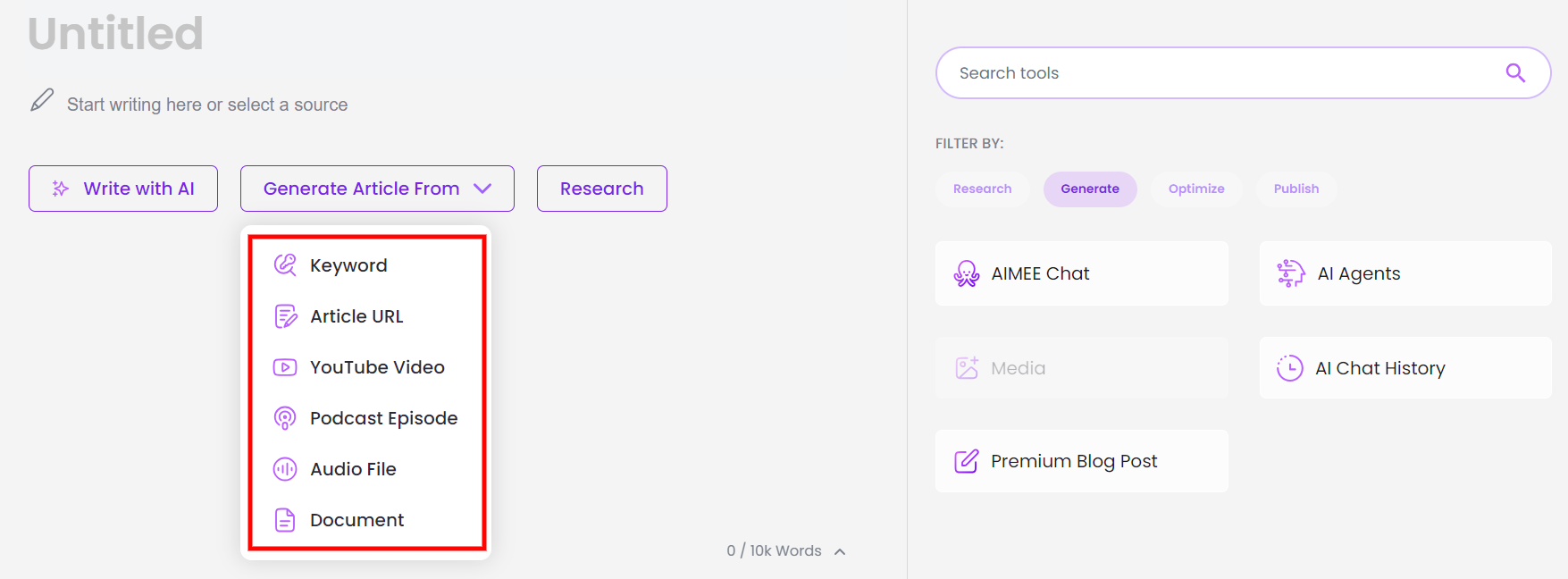
Just enter your keyword, file, or URL and BrandWell will write an original long-form article with a fresh take plus real-time research from Google.
In 2025, keeping content fresh is no longer optional — it’s a necessity. Google’s focus on quality, relevance, and user experience means that stagnant content will quickly fall behind. By proactively auditing, updating, and repurposing your content, you can maintain your rankings, engage your audience, and stay ahead of the competition.
3. Managing AI-Generated Content
The rise of AI tools like ChatGPT and Claude has made it easier than ever to produce content at scale.
One of the fast-rising tools in the AI space is BrandWell, a powerful all-in-one content marketing platform that integrates keyword research, blog generation, content intelligence, SEO, and generative AI into one single app.
Built by marketers for marketers, BrandWell can write both long-form and short-form content that ranks well in Google — with the ability to adapt to any search engine update.
A look at the BrandWell dashboard:
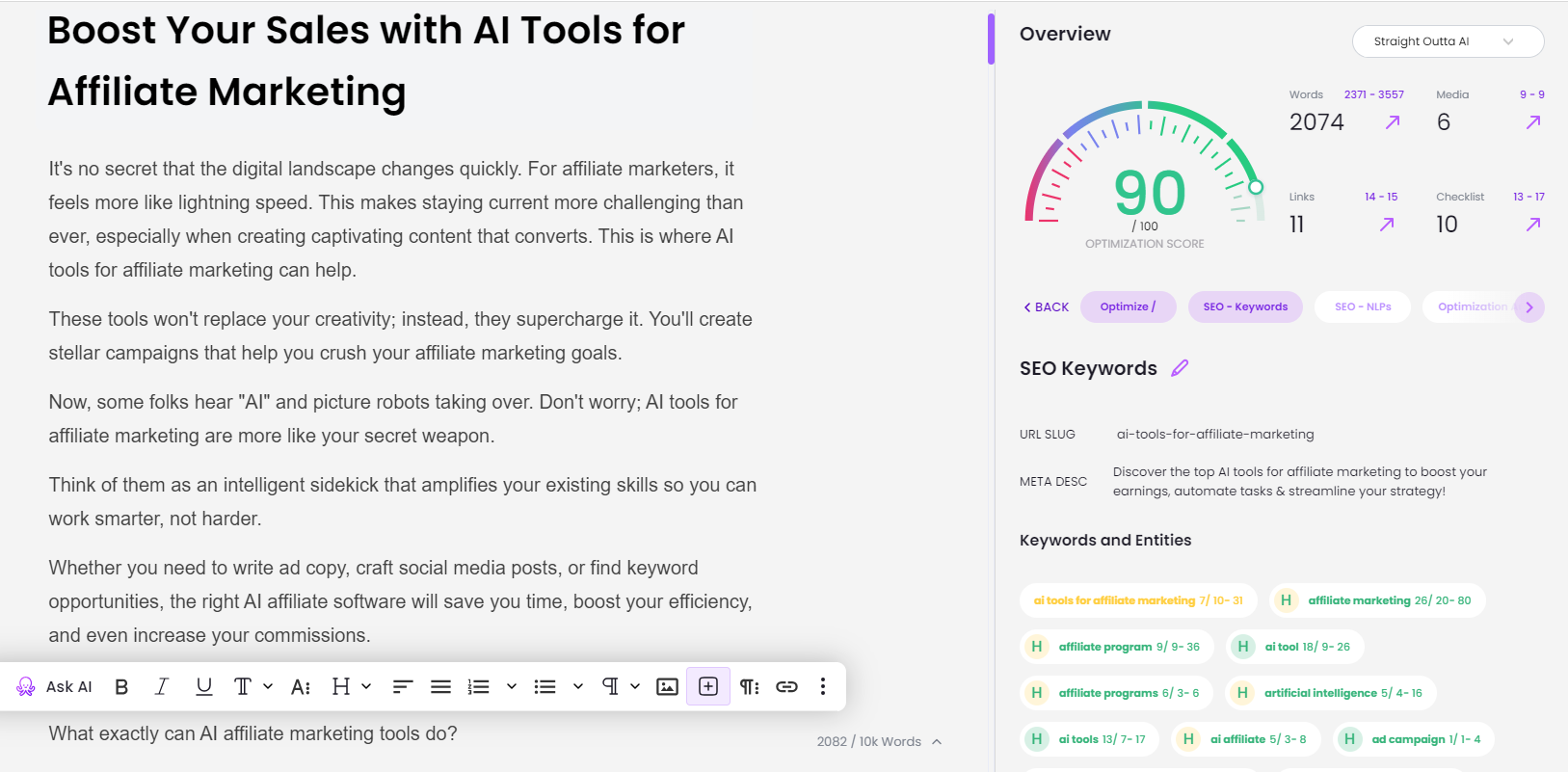
While this technology provides significant efficiencies, it also creates challenges, particularly in maintaining quality, originality, and authenticity in a sea of AI-generated material.
Google’s algorithms, with their emphasis on E-E-A-T (Experience, Expertise, Authoritativeness, Trustworthiness), are more discerning than ever, penalizing content that lacks depth, relevance, or genuine value.
The web is now flooded with AI-generated blogs, articles, and listicles, making it harder for individual pieces to stand out. Many of these machine-generated outputs are surface-level, lacking the nuanced insights or creativity that captivate audiences.
So how do you overcome this challenge?
1. Use AI as a Tool, Not a Substitute
AI is excellent for supporting content creation but cannot replace the strategic thinking, storytelling, and nuance that human writers bring.
Use AI to:
- Generate Outlines: Use AI to quickly create structured outlines for articles. For example, if writing about SEO trends, AI can propose headings like “What’s New in SEO for 2025?” or “How AI is Changing Search Behavior.”
- Incorporate Keywords: AI tools can help optimize keyword placement for SEO without overstuffing. Use tools like BrandWell for on-point keyword suggestions.
- Simplify Complex Topics: If you’re dealing with dense material (e.g., technical SEO), AI can summarize it into easy-to-digest bullet points for your audience.
- Proofread and Edit: AI tools like Grammarly or Hemingway Editor are great for enhancing clarity, fixing grammar mistakes, and improving readability scores.
- Generate Text Variations: AI can create multiple headline options or social media captions, helping you test which resonates best with your audience.
Don’t use AI to:
- Write entire articles with zero human intervention. Relying solely on AI to write your blog posts can be problematic because machines lack creativity and originality, can generate inaccurate or misleading information, lack context and nuance, can unintentionally perpetuate biases or engage in plagiarism, lack emotional intelligence, and cannot proofread or fact-check itself.
Suppose you’re writing a blog post about “How to Leverage AI for Content Marketing.” Use AI to:
- Suggest an outline (e.g., Introduction, Benefits of AI, Tools to Consider, Best Practices, Conclusion).
- Generate bullet points for “Benefits of AI,” such as scalability, efficiency, and data-driven insights.
- Edit the final draft for tone and clarity.
Then, as a human writer, add depth by:
- Sharing a case study about how your company used AI to double content output.
- Including actionable steps for each benefit.
- Infusing personal anecdotes to make the blog post relatable.
2. Focus on Original, Creative Content
In a saturated market, originality is your greatest asset. AI cannot replace human creativity, experience, or personal perspectives.
Leverage Niche Expertise:
- Write about industry-specific insights or emerging trends. For instance, instead of a generic “SEO Tips for 2025,” dive into “How B2B SaaS Companies Can Optimize for Google SGE.”
- Use your unique expertise to offer perspectives AI tools cannot replicate.
Prioritize Storytelling:
- Create a narrative that weaves facts with personal experiences. For example, explain how you overcame a specific SEO challenge using real data and outcomes.
- Build emotional connections with your audience through relatable anecdotes.
Let’s say you’re writing an article about “How AI is Transforming Customer Support.” You could include:
- A story of a company that reduced response times by 40% with AI chatbots.
- Firsthand insights into the challenges of implementing AI-based solutions.
3. Align Content With E-E-A-T Principles
Google heavily rewards content that showcases Experience, Expertise, Authoritativeness, and Trustworthiness. To align with these principles:
Demonstrate Experience: Include firsthand examples, case studies, and testimonials in your content. For example, a guide on “Improving Website UX” could feature screenshots of real projects before and after optimizations.
Showcase Expertise: Publish in-depth guides backed by data and research and cite credible sources to strengthen your claims.
Build Authoritativeness: Seek guest blogging opportunities on reputable sites, collaborate with industry influencers or link to authoritative resources in your content.
Enhance Trustworthiness: Use HTTPS for secure browsing and ensure that all claims are factual and properly sourced.
4. Optimize for User Intent
Generic AI-generated content often misses the mark on user intent. Tailor your content to match what your audience truly seeks.
- Understand Your Audience: Conduct audience research to uncover their pain points, questions, and preferences. Tools like AnswerThePublic or Google Trends can provide insight into popular queries.
- Provide Real Answers to Real Questions: For example, if users search “How to Optimize for Google SGE,” your content should provide step-by-step instructions with examples.
5. Blend AI Efficiency With Human Creativity
The best approach is to combine AI’s scalability with human ingenuity.
- Collaborate With AI: Use AI tools to brainstorm ideas, draft content, and automate mundane tasks.
- Humanize Content: Add your voice, perspective, and expertise to elevate AI-generated drafts.
- Infuse Depth: AI can generate surface-level content, but only humans can provide analysis, insights, and actionable takeaways.
For example: If AI generates a broad list of “Top 10 SEO Trends for 2025,” enhance it by:
- Adding context to each trend.
- Explaining why the trend matters and how businesses can implement it.
- Including links to additional resources.
Managing AI-generated content is about balancing efficiency with authenticity. By using AI tools to assist with repetitive tasks while infusing content with human creativity and expertise, businesses can maintain high-quality, impactful content that ranks well and resonates with audiences.
For more tips, check out our comprehensive guide on how to humanize AI content.
4. Zero-Click Search Dominance
Zero-click searches are reshaping the SEO landscape as generative search engines increasingly display answers directly on their results pages (SERPs). This reduces the need for users to visit websites, creating a significant challenge for businesses reliant on clicks for engagement and conversions.
To address this, brands must adopt multifaceted strategies to maintain visibility, engage their audience, and capture value even in a click-less environment.
1. Optimize for Featured Snippets and Knowledge Panels
Featured snippets and knowledge panels are prime real estate on SERPs. They capture user attention and establish authority. Securing these spots allows businesses to dominate zero-click interactions by providing immediate answers to user queries.
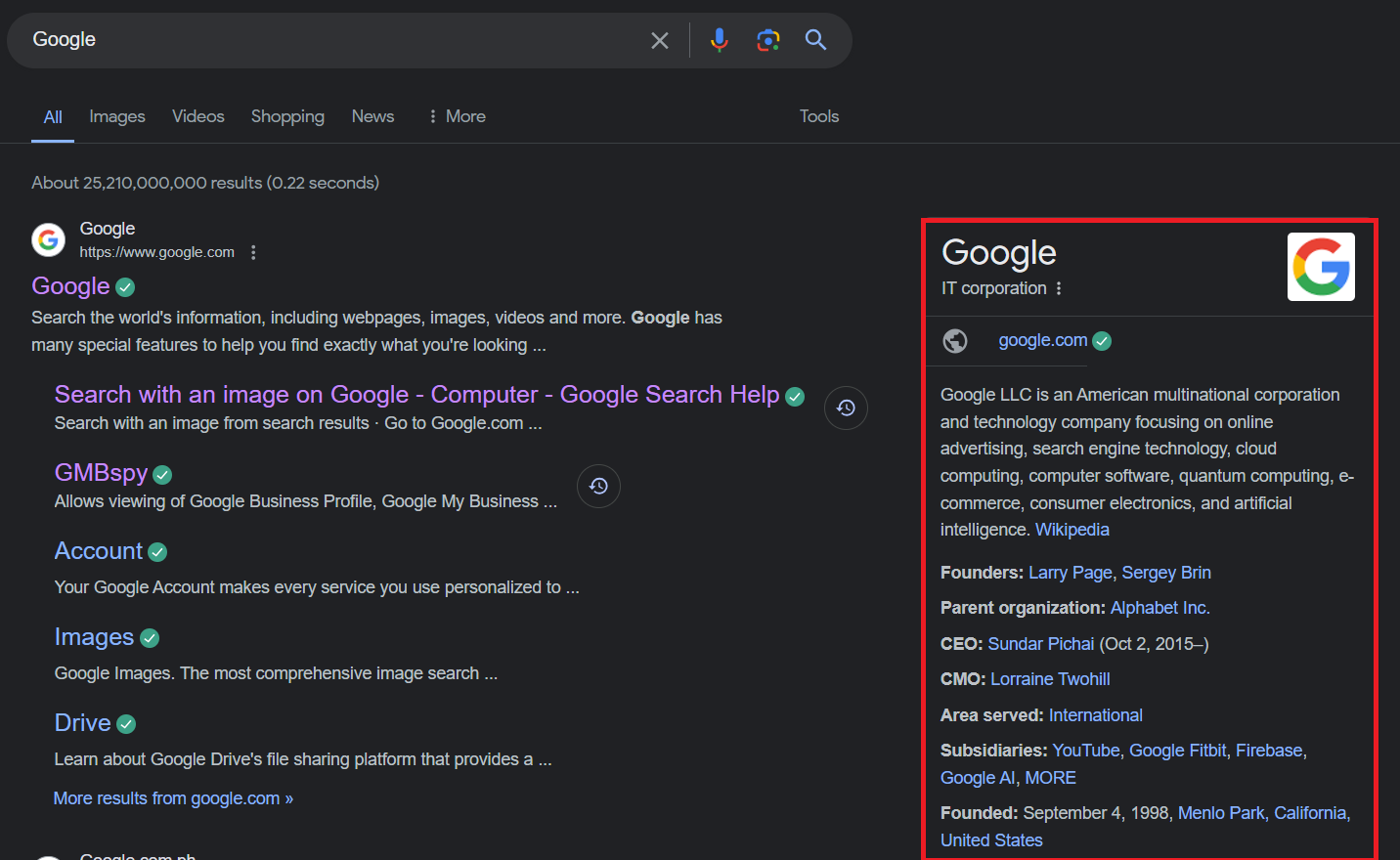
How to do it:
- Research Relevant Queries: Use tools like AnswerThePublic to identify questions your audience is asking. Focus on “how-to,” “what is,” and “why” queries.
- Create Structured Content: Break your content into clear sections with H2 to H6 headers. Use bullet points, numbered lists, or tables where appropriate.
- Write Snippet-Worthy Answers: Provide succinct, accurate answers (40-60 words) at the top of your content. Follow this with detailed explanations to satisfy users who want more.
- Enhance With Visuals: Include relevant images, infographics, or diagrams. Optimize these with descriptive alt text to improve their chances of appearing alongside knowledge panels.
- Implement Schema Markup: Use structured data like FAQ, HowTo, and Article schema to help search engines better understand and display your content.
2. Expand Beyond Google
While Google dominates the search engine market, platforms like Bing and Brave and AI-driven systems like ChatGPT and Claude are gaining ground. Ensuring visibility on multiple platforms diversifies your audience reach.
- Understand Alternative Algorithms: Research ranking factors for Bing and Brave Search. For instance, Bing places higher importance on social media signals and multimedia content.
- Tailor Content for AI Systems: Many AI systems use retrieval-augmented generation (RAG) to provide answers. Create content that’s authoritative, concise, and well-cited to increase the likelihood of being referenced.
- Submit Your Business Information: Ensure your business profiles are updated on platforms like Bing Places and other relevant directories. Accurate information increases your chances of appearing in local and branded queries.
- Optimize for Voice Search: AI tools and alternative engines prioritize voice-friendly content. Use natural language, question-based formats, and conversational tones to align with voice search behavior.
3. Leverage Alternative Platforms
Social platforms like TikTok, YouTube, and Reddit are becoming popular starting points for user research. These channels provide opportunities to drive awareness and traffic outside traditional search engines.
- Create Platform-Specific Content: Tailor your content to fit the unique formats of each platform. TikTok audiences prefer engaging short-form videos while YouTube calls for in-depth tutorials or product reviews.
- Build Communities on Reddit: Participate in niche subreddits relevant to your industry. Avoid overt self-promotion; instead, provide thoughtful answers and link to your content when appropriate.
- Collaborate With Influencers: Partner with influencers on these platforms to increase visibility and credibility. For instance, an influencer could demonstrate how your product solves a common problem in your industry.
- Use Paid Campaigns Wisely: Experiment with ad formats like TikTok Spark Ads or YouTube TrueView to amplify your reach.
4. Build a Strong Brand Following
A strong brand presence ensures users seek you out directly, bypassing the need for search engines. This is crucial as zero-click searches continue to rise.
- Develop a Unique Brand Voice: Ensure all your communications — from blogs to social posts — reflect a consistent and engaging tone. This helps users connect emotionally with your brand. Read our guide on how to build a strong brand online.
- Engage Authentically: Respond promptly to comments and messages on social platforms. Build a sense of community by hosting live events, Q&A sessions, or AMAs (Ask Me Anything).
- Invest in Thought Leadership: Publish whitepapers, host webinars, or speak at industry events to position your brand as an authority.
- Foster Loyalty: Offer exclusive benefits like discounts, early access to new products, or loyalty programs to keep your audience engaged.
5. Become a Source for AI Search Systems
AI-driven search systems like ChatGPT or Gemini often cite their sources. Being included in these overviews ensures your content is seen as authoritative, even without direct clicks.
- Publish Evergreen Content: AI systems often reference widely accepted, timeless information. Invest in content that remains relevant long-term.
- Maintain Accuracy: Use reliable data and provide clear citations. Inaccurate or poorly sourced content will be ignored by AI systems.
- Focus on Less Competitive Niches: Write in-depth content on less competitive, niche topics where your brand can stand out as a primary source.
Zero-click searches represent both a challenge and an opportunity for businesses. By optimizing for SERP features, diversifying platforms, leveraging social channels, and focusing on branding, businesses can remain competitive in 2025.
5. The Need to Adapt to Voice, Video, and Visual Search
With the rapid growth of voice, video, and visual search, traditional SEO strategies may fail to capture the full range of opportunities. Platforms like Google, YouTube, TikTok, and tools like Google Lens are pushing businesses to optimize their content for new formats.
This challenge requires a deeper understanding of how users interact with search engines today and a multi-faceted strategy to ensure visibility.
1. Optimize for Visual Search
Visual search tools like Google Lens and Pinterest Lens are transforming how users find information by analyzing images instead of text. If your business isn’t optimized for this search behavior, you’re missing out on a growing traffic source.
Use High-Quality, Unique Images: Poor-quality images are less likely to be recognized by visual search engines. Original visuals also prevent penalties arising from duplicate content. Invest in professional photography for your products, services, or content. For blog posts, create unique infographics or visual aids that enhance comprehension.
Optimize Image Metadata: Search engines rely on file names, alt text, and captions to understand images. Rename image files with descriptive, keyword-rich terms (e.g., “blue-cotton-summer-dress.jpg” instead of “IMG1234.jpg”). Write alt text that provides a meaningful context for accessibility and search engines.
Implement Schema Markup: Schema helps search engines interpret your images and connect them to relevant queries. Use ImageObject structured data to describe your images explicitly. This can improve visibility in search results.
Optimize for Mobile: Visual searches are predominantly done on mobile devices. Compress images to balance quality and loading speed. Tools like TinyPNG can help without compromising quality.
Promote Products on Google Merchant Center: If you’re in e-commerce, Google Merchant Center integrates with visual search to show your products directly in results. Create a product feed with high-quality visuals, detailed descriptions, and accurate pricing.
Here’s a step-by-step guide on how to set up your business on Google Merchant Center.
2. Use a Video-First Approach
Videos are becoming the cornerstone of content strategies in 2025. They are engaging, multi-purpose, and increasingly prioritized by platforms like Google and YouTube. A video-first approach allows businesses to produce content that can be repurposed across multiple channels.
Create Videos as a Starting Point: Videos can be easily repurposed into blog posts, social media snippets, or infographics, saving time and increasing content reach. Use tools like Loom or Descript to record quick videos featuring expert insights or product demonstrations.
Optimize Video SEO: Poorly optimized videos won’t rank well, even if they’re high-quality. Write compelling titles, descriptions, and tags using targeted keywords. Add captions and transcripts to enhance accessibility and improve SEO.
Use VideoObject Schema: VideoObject schema ensures your video is indexed correctly and eligible for rich search features. Include metadata like video duration, upload date, and a detailed description. If hosting on YouTube, link the schema to your website’s watch page.
Diversify Distribution Channels: Different platforms cater to different audiences, and videos must be tailored accordingly.
- YouTube: For long-form tutorials or in-depth explanations.
- TikTok/Reels: Short, engaging snippets for quick consumption.
- LinkedIn: Professional insights or case studies for B2B audiences.
3. Optimize for Voice Search
According to Google, 53% of US consumers said they use search engines to research a product before making a purchase.
With 64% of households owning a smart speaker, you’ll want to factor this trend into your SEO strategy now rather than later.
Voice search is growing rapidly due to AI assistants like Alexa, Siri, and Google Assistant. Users now speak in conversational tones and ask complete questions, making traditional keyword strategies less effective.

Focus on Long-Tail Keywords and Natural Phrases: Voice queries are more conversational than typed searches. Use tools like AnswerThePublic or People Also Ask to identify common questions in your niche. Optimize content to answer these directly.
Create FAQ Pages: FAQ sections naturally address voice queries in a question-and-answer format. Write concise answers to common questions while incorporating relevant keywords. Structure these with FAQ schema to improve visibility in search results.
Enhance Local SEO: Many voice searches have local intent (e.g., “best coffee shop near me”). Ensure your Google Business Profile is complete with accurate hours, descriptions, and images. Use location-based keywords in your content.
4. Integrate Text and Visual Content Seamlessly
Combining text, video, and visuals on a single page enriches the user experience and aligns with Google’s preference for diverse content formats.
Combine Videos With Articles: Some users prefer watching, while others prefer reading. Offering both caters to different preferences. Pair each video with a written summary or transcript to capture both audiences.
Summarize Key Points with Infographics: Visual aids make complex information easier to digest. Highlight key takeaways from blog posts or videos using charts or illustrations. Tools like Canva can simplify the process.
Embed Videos in Relevant Pages: Videos embedded on landing pages can increase time-on-page and conversion rates. Add videos strategically on product pages, FAQs, or service descriptions.
Experiment With Emerging Formats: Staying ahead of trends can give your business a competitive advantage. Test AR/VR content, shoppable videos, or 360-degree visuals to appeal to tech-savvy audiences.
Voice, video, and visual search aren’t just trends — they are becoming the dominant ways users interact with search engines. By optimizing for these formats, businesses can future-proof their SEO strategies and maintain a competitive edge in 2025.
6. Fierce Competition in Saturated Industries
With the growing importance of SEO, businesses across industries are investing heavily in digital visibility. This has led to an increasingly saturated online space where ranking high in search engine results is becoming more difficult, especially for smaller businesses competing against established players.
To thrive in this environment, brands must adopt targeted, creative, and innovative strategies.
1. Focus on Niche Markets
Competing head-to-head with industry giants for broad, competitive keywords is often unrealistic for smaller businesses. By focusing on niche markets, you can find less competitive areas with a highly engaged audience, allowing you to dominate that space.
Conduct Niche Market Research: Use tools like Google Trends and AnswerThePublic to identify specific gaps in content or underserved audience segments. Analyze competitors’ content and look for topics they’re not addressing. For example: Instead of targeting “digital marketing,” focus on “digital marketing strategies for healthcare startups.”
Here are a few more examples of niche markets within larger industries:
- Fitness & Wellness: Yoga for Seniors
- Food: Gluten-Free Baking
- Technology: Drone Photography for Real Estate
- Fashion: Sustainable Fashion for Maternity Wear
- Travel: Luxury Eco-Tourism
- Pet: Organic Pet Food for Dogs with Allergies
- Health: Holistic Acne Treatment
- Gaming: Mobile Gaming for Casual Gamers
- Education: Online Coding Bootcamps for Women
- Automotive: Electric Vehicle Conversion Kits
- Beauty: Vegan Skincare for Sensitive Skin
In each of these cases, the niche marketer addresses a small, highly targeted segment within the broader industry, offering tailored products, services, and content that resonate deeply with a specific group of consumers.
Create Specialized, Long-Tail Content: Target long-tail keywords with lower competition and higher intent. Write content that provides in-depth solutions to niche-specific challenges. For example: A travel agency could focus on “eco-friendly travel tips for families with toddlers.”
Localize Your Efforts: For businesses serving specific locations, use geographical keywords and update your Google Business Profile to highlight services in your area. For example: A bakery could optimize for “gluten-free wedding cakes in Austin, TX.”
2. Embrace Creativity and Innovation in Content
In a crowded market, generic content blends in, while creative and user-centric content grabs attention and keeps audiences engaged.
Leverage Personalization: Use tools like HubSpot or Segment to collect user data and create personalized content experiences.
Send personalized blog recommendations, tailored email campaigns, or dynamic landing pages.
Use AI Tools for Enhanced Creativity: Tools like ChatGPT or BrandWell can help you uncover unique angles or trending topics.
AI-generated insights can also help brainstorm unique titles, draft outlines, or optimize for SEO.
3. Invest in Storytelling and Brand Differentiation
Consumers connect emotionally with brands that tell compelling stories. A strong narrative humanizes your business and makes it memorable.
Define Your Brand Story: Share the “why” behind your brand — what inspired its creation or what problem it aims to solve. Keep the story authentic and relatable to your target audience. For example: A sustainable fashion brand could share stories of how its founders traveled the world to source eco-friendly materials.
Create Consistent Branding: Define your brand’s voice, tone, and visual identity. Use these consistently across all platforms, from your website to social media. Examples of brand voices include: playful (e.g., Wendy’s Twitter), professional (e.g., HubSpot), or inspirational (e.g., TED).
Leverage Video Storytelling: Create videos that showcase customer testimonials, behind-the-scenes content, or product usage stories. Publish on platforms like YouTube, Instagram Reels, and TikTok for maximum reach. For example: Share a short video of a customer’s journey with your product, highlighting how it transformed their business or life.
Contribute to Reputable Publications: Write guest posts for high-authority blogs in your industry to showcase your expertise.
Make yourself available to journalists who are seeking expert quotes.
5. Enhance Technical SEO and User Experience (UX)
No matter how engaging your content is, poor website performance and lack of technical optimization can hinder visibility and user retention.
Optimize Core Web Vitals: Regularly audit metrics like Largest Contentful Paint (LCP), First Input Delay (FID), and Cumulative Layout Shift (CLS) using tools like Google Search Console.
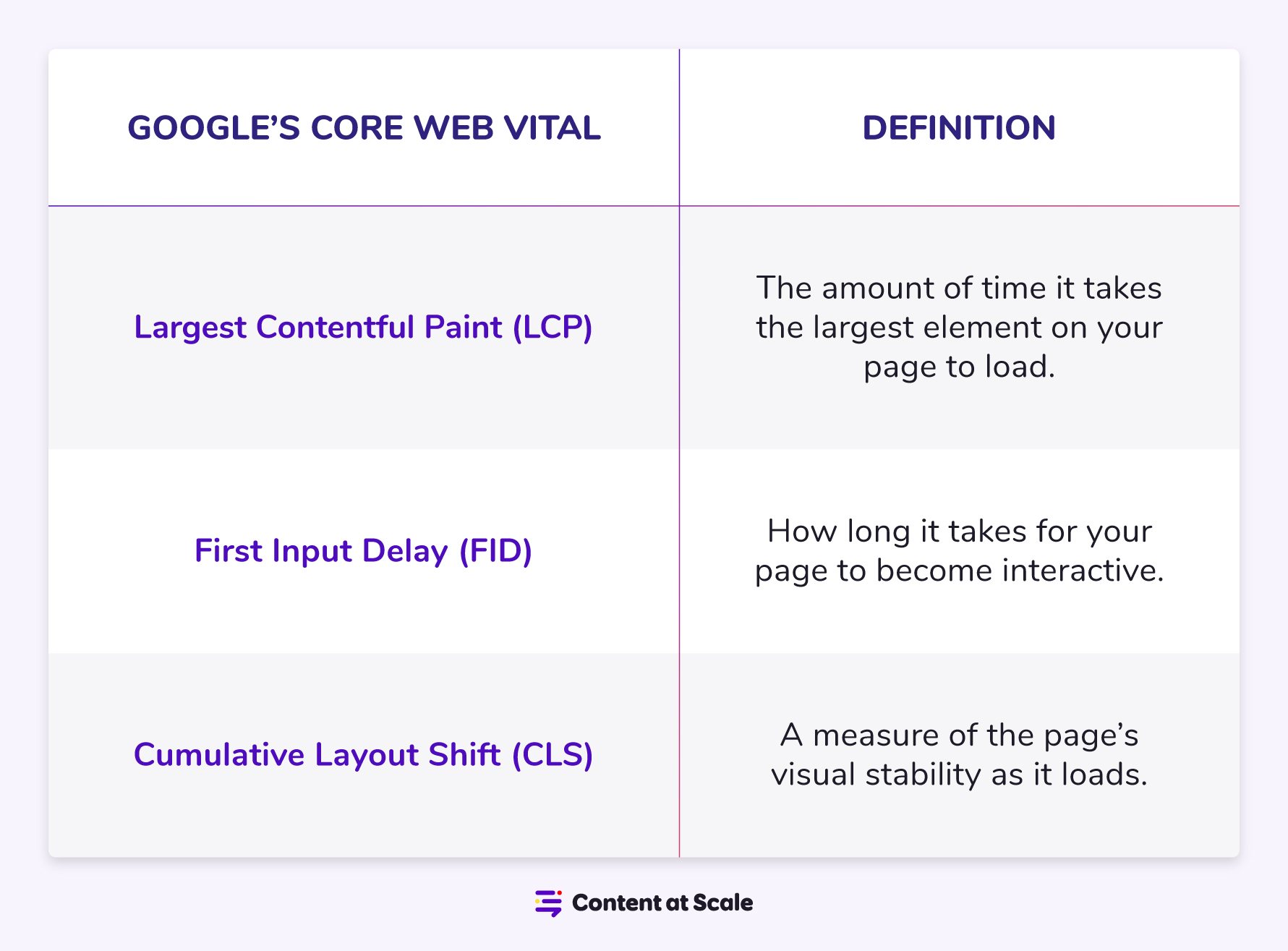
Simplify Navigation and Improve UX: Use clear menus, breadcrumbs, and internal links to guide users to the most relevant content.
Ensure forms, CTAs, and buttons are intuitive and easy to interact with.
In an increasingly crowded market, standing out requires businesses to go beyond conventional SEO tactics. By focusing on niche markets, creating innovative content, and building a compelling brand story, you can position your brand as a leader and capture your audience’s attention effectively.
7. Ensuring Ethical Practices with Increasing Reliance on Automation
While automation and AI tools offer unprecedented efficiency and scalability, these advancements also pose ethical challenges, including the spread of misinformation, privacy violations, and over-optimization. Navigating these issues requires a deliberate, ethical approach to ensure credibility, trust, and long-term success.
1. Combat Misinformation and Ensure Credibility
Misinformation can damage a brand’s reputation and erode trust. Search engines like Google prioritize trustworthy, factual content, and failing to meet these standards can hurt rankings and credibility.
Fact-Check Every Claim:
- Use only credible, authoritative sources for your content. Examples include academic journals, government websites, and industry reports.
- Integrate fact-checking tools like Snopes, Google Fact Check Explorer, or PolitiFact to ensure accuracy before publishing.
- Create an internal guideline for your team outlining acceptable sources and fact-checking procedures.
For example: If you’re writing about emerging technologies, verify claims using trusted platforms like TechCrunch, Wired, or official press releases.
Learn how to thoroughly fact-check AI content in this comprehensive guide.
Showcase Authoritativeness:
- Include detailed author bios highlighting credentials and expertise.
- Add references and citations for all critical claims to support your content.
- Use schema markup like Author Schema and Citation Schema to enhance search engine understanding.
- Display bios directly under blog posts, linking to professional profiles like LinkedIn to establish credibility.
Avoid Clickbait Tactics:
Write headlines that are informative and honest. While it’s essential to be engaging, misleading titles can harm trust and increase bounce rates.
Disclose AI-Generated Content:
If using AI tools for content creation, clearly label such content and ensure it’s human-reviewed before publication. This transparency builds user trust and aligns with ethical standards.
For example: Add a disclaimer like: “This article was drafted using AI and verified by our editorial team for accuracy and tone.”
2. Navigate User Privacy and Data Regulation Challenges
With increasing privacy concerns, search engines and governments are tightening regulations on data collection and tracking. Google’s shift away from third-party cookies and GDPR/CCPA compliance requirements complicate traditional audience targeting methods.
Transition to First-Party Data Collection:
Build relationships with your audience by collecting data directly through tools like:
- Customer Surveys: Ask for preferences to personalize offers.
- Newsletter Signups: Provide value like exclusive content or discounts in exchange for contact details.
- Account Creation: Encourage users to register for personalized services.
For example: E-commerce sites can offer loyalty points for filling out a profile or preferences survey.
Ensure Transparency and Consent:
- Make your privacy policies accessible and easy to understand.
- Use GDPR/CCPA-compliant consent banners to give users control over their data.
- Use tools like OneTrust or CookiePro to manage cookie consent dynamically across multiple regions.
Adopt Contextual Targeting:
Instead of relying on invasive tracking, use contextual targeting, which places ads based on the content of the webpage rather than user behavior.
For example: A gardening tools company could place ads on blogs about sustainable farming rather than using user-specific tracking.
Invest in Secure Data Management:
- Protect collected data with encryption and secure storage solutions.
- Regularly audit your data storage practices to ensure compliance with new regulations.
3. Ethical Use of AI and Automation Tools
AI tools can streamline SEO and content creation, but unethical practices, such as keyword stuffing or low-quality content generation, can harm your brand’s reputation and invite penalties from search engines.
Avoid Over-Optimization:
AI tools can optimize content, but resist the temptation to overuse keywords or create spammy backlinks. Focus on genuine value for readers.
Test for Bias:
Regularly evaluate AI outputs for unintended biases, offensive content, or inaccuracies. Use diverse datasets when training custom AI models to ensure fair outputs.
For example: If generating product descriptions, ensure the language appeals equally across different demographics without stereotypes.
Set Guidelines for Responsible AI Use:
Develop internal policies for your team on how and when AI can be used. Educate employees about the ethical implications of automation.
Encourage Reviews and Testimonials:
- Request genuine customer reviews and feature them prominently on your website.
- Respond to feedback, whether positive or negative, to show that you value customer opinions.
As automation becomes a cornerstone of SEO, ethical practices must remain the guiding principle. By combating misinformation, respecting user privacy, using AI responsibly, and fostering transparency, businesses can ensure long-term success while maintaining credibility and trust.
Ethical SEO isn’t just about avoiding penalties from search engines; it’s about building meaningful connections and delivering real value.
8. Navigating Potential Skill Gaps and Budget Limitations
With the rapid evolution of SEO, teams are increasingly facing skill gaps, budget constraints, and overwhelming workloads. This challenge is exacerbated by the need to compete in a highly saturated digital market while justifying ROI to stakeholders.
According to a NewzDash survey, the biggest hurdles for SEO teams in 2025 are:
- Budgets: 34% of SEO teams struggle with limited funds for tools and resources. (45% operate with less than $1,000/month for SEO tools while 13% have no budget at all, relying on free resources.)
- Workload: Most SEO teams handle multiple brands or websites. (One SEO specialist manages an average of 4.5 brands or websites.)
- Skills Gap: 24% of SEO teams report a lack of advanced SEO expertise. (55% offer only basic SEO training to editorial teams,
27% provide regular workshops, and 14% offer advanced training.) - Tools: 17% cite a lack of specialized SEO tools for news publishers.
- Hiring: 13% say finding skilled SEO talent is difficult.
How do you overcome these challenges in 2025?
1. Scale Up
Leverage Free and Affordable Tools:
Many free or low-cost tools can replace premium solutions for small businesses or teams with tight budgets.
- Google Search Console: For monitoring site performance and identifying indexing issues.
- Google Analytics: For tracking traffic, conversions, and audience behavior.
- AnswerThePublic: For discovering long-tail keyword opportunities.
- Screaming Frog (Free Version): For basic site audits, identifying broken links, and analyzing metadata.
Invest in Evergreen Content:
Evergreen content remains relevant over time, reducing the need for frequent updates.
- Focus on creating guides, how-tos, or case studies tailored to your audience.
- Incorporate timeless keywords and ensure content addresses long-term customer pain points.
- Update evergreen content periodically with fresh examples or data to keep it relevant.
For example: A blog titled “SEO Basics for Beginners” can generate consistent organic traffic for years with minimal updates.
Automate Repetitive Tasks:
Automation can save time and resources, allowing teams to focus on strategy.
- Use tools like Zapier to integrate SEO platforms with reporting tools for seamless data analysis.
- Automate your entire content creation process with BrandWell — keyword research, topic reports, blog writing, metadata, keyword optimization, content audits, and WordPress publishing are all done by AI!
2. Address Skill Gaps with Training and Collaboration
Invest in Training Programs:
Continuous learning ensures your team stays up-to-date with emerging SEO trends and tools.
- Provide access to online courses from platforms like Coursera, Udemy, and HubSpot Academy.
- Encourage team members to earn certifications in specialized skills, such as schema markup or AI-driven SEO.
- Organize in-house workshops led by external experts.
For example: Host a quarterly training session on voice search optimization to ensure your team is prepared for its growing importance.
Foster Cross-Functional Collaboration:
Collaboration between SEO, content, and web development teams ensures alignment of goals.
- SEO teams can provide keyword research insights to content creators.
- Web developers can work closely with SEO specialists to optimize site speed, schema markup, and mobile usability.
For example: Conduct monthly meetings where the SEO team shares analytics data with the content team to refine strategy.
Leverage External Expertise:
Hiring freelancers or consultants can fill gaps without long-term commitments.
- Use platforms like Fiverr or Indeed to find skilled SEO professionals for specific projects.
- Engage consultants to develop advanced strategies while training your in-house team.
For example: Hire a consultant to conduct an AI-driven content gap analysis and provide actionable insights.
3. Manage Heavy Workloads Effectively
Specialize and Delegate Tasks:
Assign roles based on individual strengths to avoid spreading team members too thin.
- Specializations could include keyword research, technical SEO, content optimization, or link building.
- Outsource routine tasks like backlink outreach to save time.
For example: A team member focusing solely on technical SEO can improve site health metrics significantly.
Streamline Processes with Tools:
Use project management tools to track tasks and deadlines efficiently.
- Tools like Asana, Trello, or Monday.com enable task prioritization and collaboration.
- You can also use BrandWell’s in-app content calendar to plan your keywords and blog posts.
- Create workflows for repetitive tasks, like updating metadata or publishing blogs.
For example: Set up a Trello board with columns for keyword research, drafts, edits, and final approval.
Batch Content Production:
Produce content in batches to maximize efficiency.
- Plan and outline multiple pieces of content in one session.
- Dedicate specific days for publishing blogs, producing video content, and social media posts.
💡Pro tip: BrandWell has a bulk upload feature that lets you run up to 100 keywords simultaneously, producing in-depth blog posts for each topic in just a few hours instead of months!
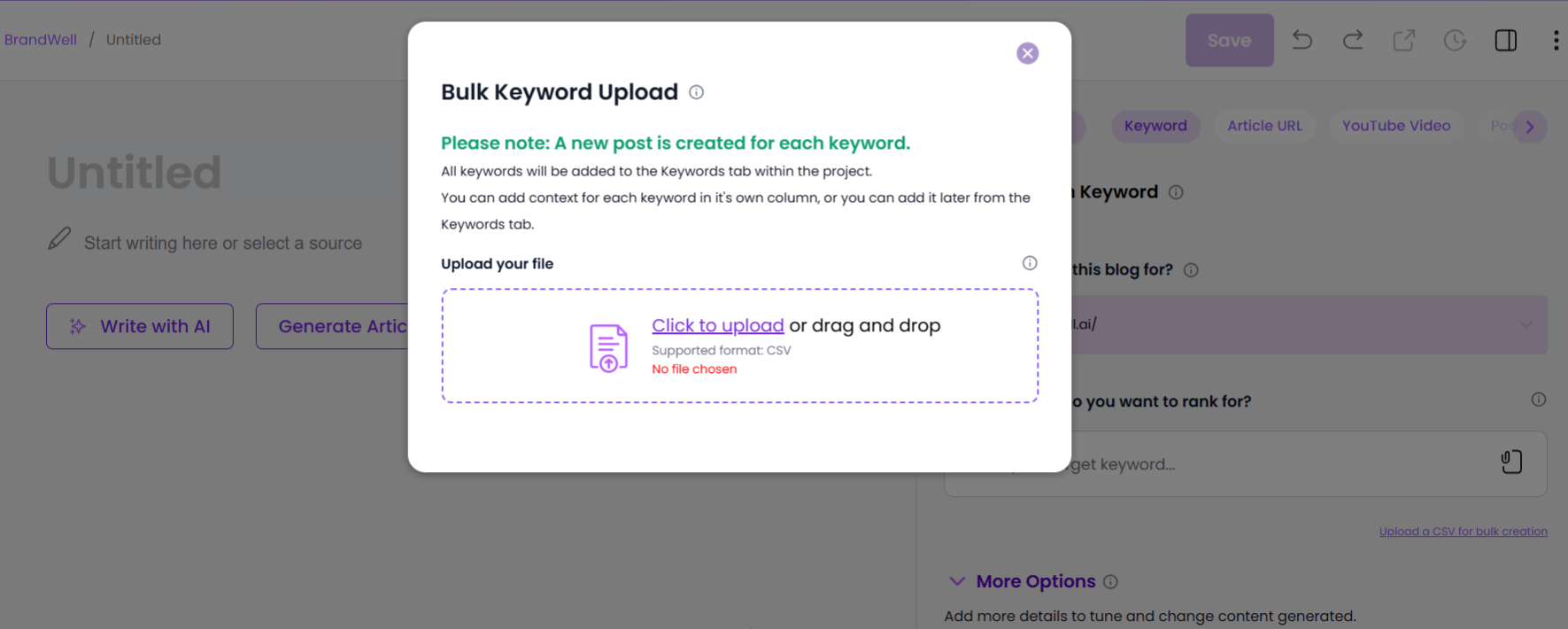
4. Justify SEO Investments to Stakeholders
Educate Stakeholders on SEO ROI:
Help stakeholders understand the value of SEO by tying efforts to business goals.
- Use case studies or competitor analyses to illustrate potential outcomes.
- Highlight SEO’s role in lead generation, brand visibility, and customer retention.
For example: Present data showing how a competitor’s SEO efforts resulted in a 40% increase in organic traffic and leads.
Align SEO Metrics with Business Objectives:
Show how SEO impacts the bottom line.
- Tie keyword rankings and traffic improvements directly to revenue or lead generation.
- Set realistic goals, such as increasing organic traffic by 20% in six months.
For example: Report that ranking on Page 1 for a high-intent keyword generated 50 new leads.
Skill gaps and budget limitations can be challenging, but they are not insurmountable. Success lies in focusing on efficiency, continuous learning, and demonstrating measurable results to justify investments.
FAQs: SEO Challenges
What is the biggest challenge in SEO?
The biggest challenge in SEO is adapting to increasingly sophisticated AI-driven search algorithms, which prioritize user intent, high-quality content, and real-time relevance, making it crucial to stay agile and focus on delivering genuine value to users.
What is SEO difficulty?
SEO difficulty is a rating system from 1 to 100 that describes how hard it is to outrank the top 10 results on a search results page based on a specific keyword or query.
Ranking high on SERPs encompasses the authority of existing sites, the quality and relevance of their backlinks, and the overall strength of their optimization efforts.
Why is SEO so difficult?
Aside from adapting to constant search algorithm changes from the search engines, SEO is an ongoing, long-term process. It takes time, resources, strategy, technical skills, analytical capabilities, a robust and growing content calendar, and patience.
Just like growing any area of your business. SEO is a marathon, not a sprint.
What are the benefits and challenges of SEO?
With more businesses joining the Internet daily, outranking your competitors becomes more challenging. It is up to individual SEO professionals to commit to long-term consistency.
Content has always been the biggest factor, and this likely won’t change as Google regularly updates algorithms.
Conclusion
So there you have it, my list of SEO challenges I think you should really focus on this year.
Although the digital landscape feels a bit shaky these days, one thing will always stay constant: valuable content and providing users with an excellent mobile experience will always be rewarded by search engines, making SEO challenges much easier to navigate.
Your road to helpful content starts with BrandWell. Sign up for this all-in-one brand growth engine and start producing long-form and short-form content that resonates with your audience.

